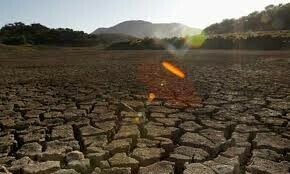OVER two years ago, this column commented on UN Secretary General Ban Ki-moon’s ‘Chicken Little’ statement at the 150-country Geneva environmental conference.
Returning from the Arctic where he witnessed firsthand the melting of the polar icecap, he warned that the world was speeding to a climate Armageddon: “Our foot is stuck on the accelerator and we are heading towards an abyss.”
Ban cautioned that numerous “more distant scenarios” projected by scientists were “happening now”. “Scientists have been accused for years of scaremongering. But the real scaremongers are those who say we cannot afford climate action — that it will hold back economic growth. They are wrong. Climate change could spell widespread disaster.”
The situation has worsened since then: this planet is many miles closer to the abyss, owing to the ‘tragedy of the commons’.
Such predicaments typically arise when many individuals, acting independently, guarding their own self-interest quite rationally, ultimately exhaust a shared finite resource, even when it is spectacularly clear that this is not in any one individual’s long-term interest.
The developed countries (which have caused the larger share of the problem over the past 200 years), the rapidly industrialising countries (which are now escalating their contribution to the chaos) and the poorer countries (read Pakistan) which will bear the brunt of the environmental consequences, are unable or unwilling to reduce economic growth and are pouring more and more green-house gas (GHG) pollution into the atmospheric commons, generating the inevitability of an apocalypse.
Internationally, climate scientists agree that global-warming of 1.5Ú°C to 2Ú°C above pre-industrial levels marks the limit of safety, beyond which climate change becomes devastating and irreversible, causing dangerous sea-level rises, crazy rainfall patterns and frequent extreme weather.
Consequently, carbon dioxide levels in the atmosphere, presently about 392ppm (parts per million) and increasing by 2ppm to 3ppm every year, must not be allowed to exceed 450ppm.
More alarmingly, a month ago the International Energy Agency warned that unless we change direction today, the rate at which the world is building fossil-fuelled power stations, energy-guzzling factories and inefficient buildings will make it impossible after the next five years to hold global warming to safe levels in the future, and the last chance of combating cataclysmic climate change will be lost forever. Anything built from now on that produces carbon will do so for decades, and this ‘lock-in’ effect will be the single factor most likely to produce irreparable climate change.
Since the 1992 Rio Summit, “the most important negotiations ever undertaken in the history of humankind” have been regularly, but impotently, conducted by the UN Framework Convention on Climate Change (UNFCCC).
The UN Climate Change Conference 2011 is presently (Nov 28 to Dec 9) being held in Durban to supposedly advance, in balanced fashion, the implementation of the UNFCC and the 1997 Kyoto Protocol, the 2007 Bali Action Plan and the 2010 Cancun Agreements. The methodology used will be ‘Indaba’.
As explained on the UNFCC website, “Indaba is a word in IsiZulu that refers to a gathering of people, infused with wisdom and Ubuntu [I am what I am because of who we are], with a purpose of discussing a matter of great importance to the community, particularly problems that affect everyone, and to solve intractable or difficult collective challenges.
“Indabas aim at establishing a common mind or a common story that all participants can take with them. In successful Indabas, participants come with open minds motivated by the spirit of the common good, listening to each other to find compromises that will benefit the community as a whole.” Will this work?
Pakistan is blatantly oblivious to this evolving disaster. Despite the extensive havoc experienced during the river floods of 2010 and the rain floods of 2011 (the after-effects of which will linger for many years), the government will not straighten out its act and deliberately keeps the federal and provincial EPAs under-funded, understaffed, incompetent and corrupt.
Implementation of environmental laws is virtually non-existent. Last week, the prime minister praised the ‘Dubai-like’ qualities of a high-priced waterfront food-street in Karachi. Emulation of Dubai and Qatar, the planet’s highest per capita over-consumers and contributors to GHG pollution, is a high priority among our deep-pocketed movers and shakers.
The superior courts of Pakistan struggle while trying to keep the feet of our greedy polluters and environment degraders off ‘the accelerator’. One success is the Lahore Doongi Ground case. In 2006, 16 citizens spearheaded by Shehri, an environmental advocacy group, challenged the arbitrary conversion of a 55-year old park space into a commercial complex with cinema, shopping arcade and bowling alleys.
Two months ago, a five-judge bench of the Lahore High Court, headed by Chief Justice Ijaz Ahmad Chaudhry, declared the proposed conversion illegal, and directed that “delinquent persons” responsible for the “not above-board project” be identified and “appropriate action ... taken against them in accordance with the law.”On the other hand, the Webb Ground issue in Karachi’s Lines Area lingers on. In mid-2009, Chief Justice Iftikhar Chaudhry took suo motu notice of the capture and conversion of a 100-year playground in a low-income area that was unlawfully leased to the cash-and-carry store, Makro-Habib.
In a landmark judgment written by Justice Jawwad Khawaja in December 2009, the encroachers’ lease was cancelled and they were directed to vacate the amenity plot within three months so that the city government could re-establish a public playground.
In mid-March 2010, Makro-Habib filed a review petition, and obtained a stay-order. Between March and October 2010, the court was inundated with voluminous additional documents during four hearings. It has been almost 14 months since the last hearing. The Lines Area children remain deprived of a recreational space.
arfc@cyber.net.pk











































